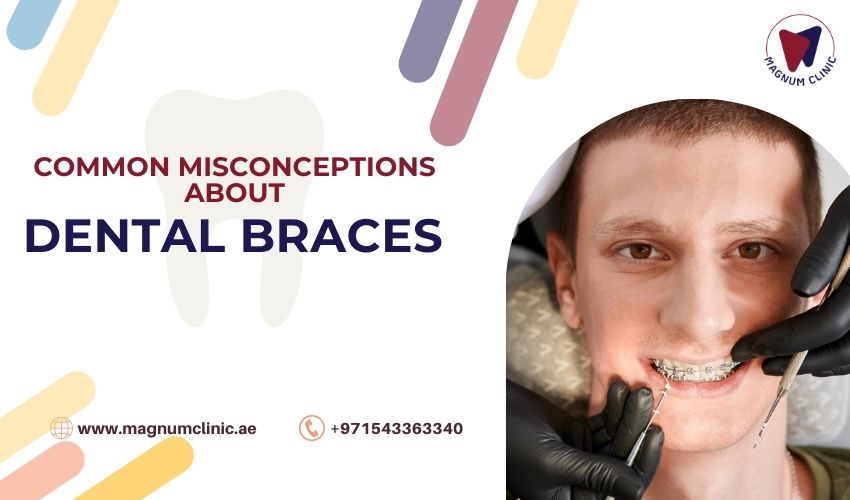Common Misconceptions About Dental Braces Debunked

Dental braces have been pivotal in straightening teeth and improving oral health for decades. Despite their effectiveness, numerous misconceptions and myths surround this orthodontic treatment. In this article, we will debunk common misconceptions about dental braces, providing you with accurate information to make informed decisions about your dental health.
Myths
Myth 1: Dental Braces Are Only for Kids
Contrary to popular belief, dental braces are not exclusively for children. While many people receive orthodontic treatment during their teenage years, adults can also benefit from braces. Orthodontic advancements have allowed individuals of all ages to achieve straighter teeth and a healthier smile.
Myth 2: Dental Braces Are Exclusively Cosmetic
Although braces enhance your smile's appearance, their benefits go beyond aesthetics. They can correct misaligned bites, improve oral hygiene, and prevent dental issues like gum disease and tooth decay. Dental braces address both cosmetic and functional concerns.
Myth 3: Braces Are Painful and Uncomfortable
While it's true that there may be some discomfort initially, modern braces are designed to minimize pain. Your orthodontist will guide you in managing discomfort, which will diminish as your teeth adjust.
Myth 4: Braces Are the Only Solution
Dental braces are a common solution, but they are not the only ones. In some cases, alternatives like clear aligners or retainers may be suitable for mild alignment issues. Your orthodontist will recommend the best treatment for your specific needs.
Myth 5: Metal Braces Are the Only Option
Traditional metal braces are just one option. Ceramic braces and clear aligners are also available for those who prefer a more discreet treatment option. Your orthodontist will help you choose the most suitable type for your situation.
Myth 6: Braces Are a Quick Fix
Orthodontic treatment takes time and patience. It's a gradual process that ensures long-lasting results. Be prepared for a treatment duration ranging from several months to a few years, depending on your needs.
Myth 7: Braces Are High Maintenance
While braces require some maintenance, it's not as challenging as you might think. Regular brushing and flossing, along with occasional adjustments by your orthodontist, are typically all that is needed to keep your braces in good shape.
Myth 8: Dental Braces Debunked Will Set Off Airport Security
This is a common misconception. Dental braces do not contain metal that will trigger airport security alarms. You can travel worry-free with braces.
Myth 9: Braces Can Be DIY
Attempting to straighten your teeth without professional guidance can lead to serious oral health issues. Always seek the expertise of an orthodontist to ensure safe and effective treatment.
Myth 10: Braces Are Forever
Braces are a temporary treatment. Once your teeth are properly aligned, your orthodontist will remove them, and you will transition to a retainer to maintain your results.
Myth 11: Braces Are Too Expensive
The cost of braces varies, but many orthodontic offices offer payment plans and insurance coverage. Your orthodontist can help you find a financial solution that suits your budget.
Myth 12: Braces Are Only for Crooked Teeth
Braces can address dental issues, including overbites, underbites, and cross-bites. They are not limited to treating crooked teeth.
Myth 13: Dental Braces Interfere with Speech
While there may be an adjustment period, braces do not significantly impact speech. Most people adapt quickly and continue speaking normally.
Myth 14: Braces Are Obvious and Unattractive
Modern braces are more discreet than ever. Clear or ceramic braces are less noticeable, making them a popular choice for those concerned about appearance.
Myth 15: Braces Are a Sign of Poor Dental Hygiene
Having braces doesn't imply poor dental hygiene. Dental braces often improve oral hygiene by making cleaning and maintaining teeth and gums easier.
Read Also: Foods Should Avoid With Dental Braces
Conclusion
Dental braces are valuable in achieving a healthy, beautiful smile. You can make informed decisions about your orthodontic treatment by dispelling these common misconceptions. Consulting with an experienced orthodontist is the first step towards a confident and healthy smile.
FAQs (Frequently Asked Questions)
How long do I need to wear my dental braces unblocked?
The duration of braces treatment varies but typically ranges from several months to a few years, depending on your needs.
Are there alternatives to traditional metal braces?
Yes, alternatives like clear aligners and ceramic braces offer more discreet options for orthodontic treatment.
Do braces hurt?
While there may be some initial discomfort, modern braces are designed to minimise pain, and your orthodontist can help manage any discomfort.
Can I travel with braces without setting off airport security?
Yes, dental braces do not contain materials that trigger airport security alarms.
Do braces interfere with speech?
There may be an adjustment period, but braces typically do not significantly impact speech, and most people adapt quickly.
